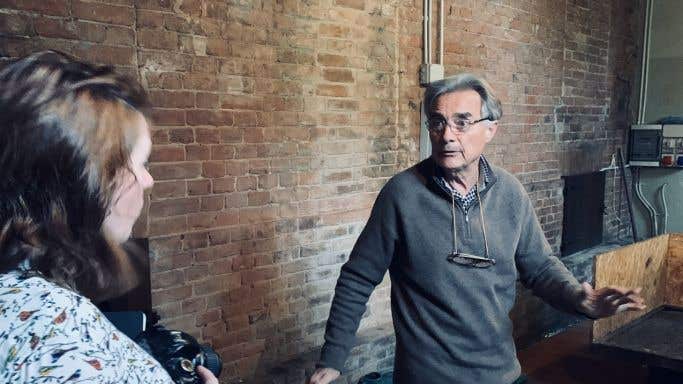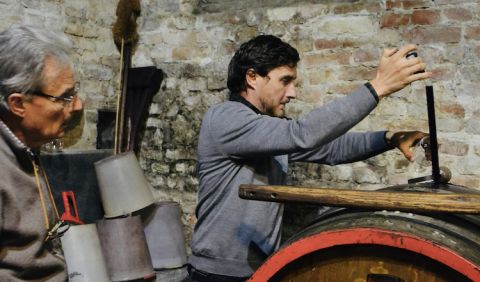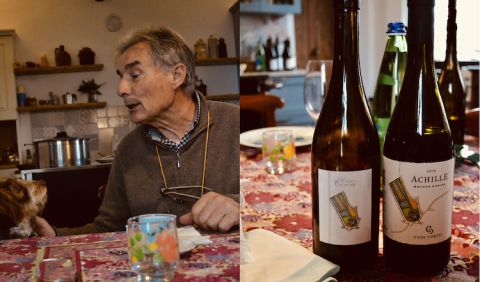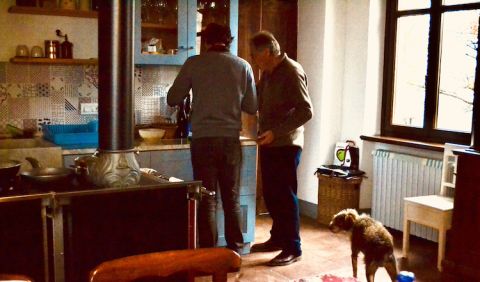2021 saw the passing of one of the wine world's unsung heroes. Arnica Rowan, seen above with him, was a big fan.
Although little-known outside Italy and wine's academia, Lorenzo Corino had a deep impact on Italian wine culture and the country's movement towards 'slow wine'. As with other visionaries ahead of their time, Lorenzo's greatest influence is yet to come, I suspect, as the world of wine discovers the academic's inspired teachings posthumously.
I first heard of Lorenzo in 2019, when exploring the exhibitor list of Isabelle Legeron MW's RAW wine fair. I was preparing for my first trip to Piemonte and wanted to connect with meaningful producers driving the natural-wine movement in Italy. Case Corini's winemaker's biography intrigued me. Lorenzo Corino was described as an agronomist, researcher and sixth-generation winemaker in Costigliole d'Asti. I emailed Lorenzo and he agreed to a visit. Little did I know how this routine encounter would transform my approach to wine.
The morning my husband Jason and I were leaving our homestay in Barolo to drive to Costigliole d'Asti, I mentioned to our host Gian Luca Colombo (Italy's 2014 Young Winemaker of the Year and described in this article by Walter as 'Langhe's whizz-kid') that I had an appointment to spend an afternoon with Lorenzo.
'I am so jealous!' Gian Luca exclaimed. He explained to me that as the former head of wine research in the Langhe, Lorenzo was deeply respected in the wine community. 'He is like a god to us – really no one knows more about wine than Lorenzo Corino.'
A quiet, gentle man, strong in opinions but restrained in character, Lorenzo devoted his life to learning about wine. Born two months after the grape harvest in 1947, he was raised in the rolling hills of the Langhe. Lorenzo began his professional life as an agronomist, researching in Piacenza and at Cambridge in the UK, before returning to his home region and joining the Istituto Sperimentale per la Viticoltura di Conegliano Veneto, in Asti. His academic career culminated in the role of executive research director at the oenological research institute in Asti, a position he held until he retired.
With a voracious appetite for academic enquiry, Lorenzo researched viticulture, plant soils, climate trends, the behaviour of grape varieties and rootstocks, writing and co-writing over 90 published academic articles. He travelled the world studying and collaborating with governments, research institutes and companies.
According to his son Guido, with whom I corresponded recently, Lorenzo truly was in love with research, teaching and writing. The life of an academic was his 'suitable place' in the wine world, where he could not only experiment and amass knowledge, but also share it with others.
When Jason and I arrived at Lorenzo's large, three-storey red-brick house, with modest brown shutters at every window and surrounded by gently swaying trees, I was struck by the permanence of his ancient Costigliole d'Asti family home. Lorenzo came outside to greet us, dressed in a grey wool sweater and navy corduroys, his grey hair swooped back in a dapper rural gentleman's fashion. He invited us into his parlour, with solid mahogany furniture that had been passed down for generations and likely had sat in the same place for decades. His scruffy little dog Bric followed us in and begged for treats, which of course I always have in my pocket. We sat around the sizeable dining table and got to know each other. He curiously enquired about Canada and our wine culture, and shared with us his deep connection to the lenga piemontèisa, the Piemontese way of life.
Eventually his son Guido joined us – we had inadvertently arrived on a saint's day – and we went down the tidily-swept brick stairs into the basement cellars. Among the ancient wooden vats there stood a fibreglass tank (below). Lorenzo laughed and explained that even though he was retired, he was still experimenting.
As Guido took Nebbiolo samples from barrels (see below), Lorenzo gravely took me aside. Solemnly, he told me that the secret to winemaking is one thing: the moment of harvest. He said that yes, taking care of the land and farming organically was a given, but the only real moment of decision for those making wine is this moment of harvest. If you get the timing right, and only use the best fruit, then everything else just falls into place. There is no need to add yeast or intervene in the fermentation process. It all just happens.
This simple, careful explanation belied the complexity of what he was teaching me. This is the way that Lorenzo communicated and shared his vast knowledge with others. His son Guido described him as 'a very strict, generous and upright person; a hard worker, correct and headstrong, but always a good friend'. He was careful in his words, but everything he told you had volumes of meaning behind it.
In his retirement years, Lorenzo began sharing his thoughts on viticulture and winemaking in emails to his neighbours and friends. These informal teachings were eventually gathered into a small book of essays: The Essence of Wine and Natural Viticulture. Published as the book's foreword, Angelo Gaja wrote to Lorenzo what an inspirational impact his teachings had on him.
'Even though [your writings] often seem provocative to me, utopian, rich in suggestions and proposals that are difficult, if not impossible to achieve. And when, while reading, I discover something that's feasible in our vineyards, you go and raise the bar in your next piece and the goal becomes further from reach. Thus, improperly, I tell you you're a dreamer. But I give you credit for forcing me, more than anyone or anything else, to think about the way we undertake viticulture. The interpretation of your dreams has spurred me and the winemakers who read you to try to do better.'
After staining our teeth in the cellar, we were invited up to Lorenzo's kitchen on the second floor of his home. His housekeeper had left a simple country soup warm on the massive wood stove in the middle of the room. Lorenzo and Guido fried up some cutlets and vegetables – carrots from his own garden – and we sat and talked around the kitchen table, Lorenzo feeding the dog Bric little slivers of cutlet from his plate.
Throughout the meal, Lorenzo shared two bottles of Case Corini Nebbiolo that had been sitting already open on the counter. The first, 2016 Case Corini Achille, shone a deep garnet and when I raised the stout stemless glass to my nose, I was struck by the wildness of the wine. It was my first encounter with very fine, natural wine, and I was overwhelmed by the aromas of dried cherries, sultanas, carnations and spice, laced with game. I couldn't believe it was only a three-year-old wine.
Then Lorenzo poured me a glass of the 2009, labeled simply Case Corini, which, he mused, had been sitting open for over a week, so it was likely ready to be poured.
I dove into the tiny glass and found myself on an Alice in Wonderland journey. It began in Lorenzo's parlour, with whiffs of mahogany and waves of bouquets of dried flowers commemorating the family's many generations of celebrations. Then my notes tell me I fell down a red-brick wishing well, and landed outside Lorenzo's home, surrounded by the tumbled vegetable gardens, fields of wild Piemontese flowers and the sound of the wind blowing through the tops of the poplar trees. It was one of the most transformative glasses of wine I've had the pleasure to drink.
Lorenzo waved my exclamations aside and focused the conversation instead on our next meeting. He invited us to return his home the next fall of 2020, and to bring our teenage daughters for a stay. He suggested that we should come at harvest time, help pick grapes with the rest of the family, and learn some Piemontese. He would teach me the perfect moment to pick the grapes, and the rest would be easy. I told him we would come, and tell his story so more people outside of Italy could learn from him. We shook hands and made promises to see each other again soon.
Of course, we all know what happened the next year. When COVID hit Italy four months later, I emailed Lorenzo to check on him and see if he was fine. He told me all was quiet in his little corner of the Langhe and not to worry.
Lorenzo Corino passed away from a long battle with cancer on 4 November 2021. Lorenzo's contributions to academic knowledge, his mentorship of Italian producers and his own wines will live on. His long-time collaborator Antonella Manuli will continue farming, following the metodo Corino at Fattoria La Maliosa, in the Maremma to the south. His son Guido and his daughter Luisa intend to continue winemaking as the seventh generation at Case Corini, on the windy Piemontese hills of Costigliole d'Asti.
Lorenzo will be forever respected for his work, revered for his teachings and remembered for his graciousness.





